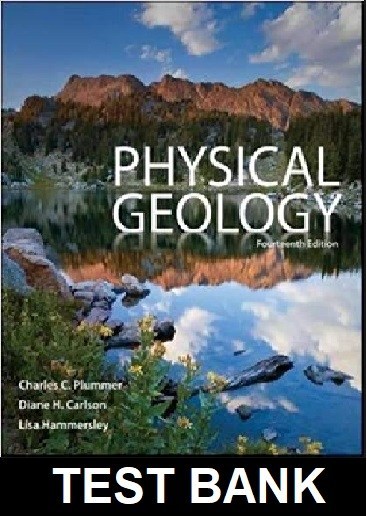Description
Test Bank For Physical Geology 14th Edition by Plummer
Chapter 03
Igneous Rocks, Intrusive Activity, and the Origin of Igneous Rocks
True / False Questions
1. Rhyolite is considerably more common than granite.
FALSE
Bloom’s Level: 2. Understand
Topic: Igneous Environments
2. Diorite and andesite are composed of similar amounts of feldspars and ferromagnesian minerals.
TRUE
Bloom’s Level: 1. Remember
Topic: Igneous Environments
3. Lava is magma on the Earth’s surface.
TRUE
Bloom’s Level: 1. Remember
Topic: Igneous Environments
4. Extrusive igneous rocks are typically fine grained because they crystallized slowly, deep below the Earth’s surface.
FALSE
Bloom’s Level: 2. Understand
Topic: Igneous Environments
5. A dike is a discordant intrusive igneous structure.
TRUE
Bloom’s Level: 1. Remember
Topic: Igneous Environments
6. The geothermal gradient is the rate at which pressure increases with increasing depth beneath the surface.
FALSE
Bloom’s Level: 1. Remember
Topic: Igneous Environments
7. Mafic igneous rocks are silica-poor.
TRUE
Bloom’s Level: 2. Understand
Topic: Igneous Environments
8. A mineral’s melting point generally increases with increasing pressure.
TRUE
Bloom’s Level: 2. Understand
Topic: Igneous Environments
9. Although batholiths may contain mafic and intermediate rocks, they almost never composed of granite.
FALSE
Bloom’s Level: 2. Understand
Topic: Igneous Environments
10. The sequence in which minerals crystallize in a cooling igneous melt is called Bowen’s Reaction Series.
TRUE
Bloom’s Level: 1. Remember
Topic: Igneous Environments
11. The continuous branch in Bowen’s Reaction Series contains the ferromagnesian minerals.
FALSE
Bloom’s Level: 1. Remember
Topic: Igneous Environments
12. A pluton is an igneous structure that crystallized at very shallow depths.
FALSE
Bloom’s Level: 1. Remember
Topic: Igneous Environments
13. Partial melting of the lower continental crust produces a silicic magma that eventually solidifies into granite or rhyolite.
TRUE
Bloom’s Level: 2. Understand
Topic: Igneous Environments
14. An ultramafic rock is composed almost entirely of quartz.
FALSE
Bloom’s Level: 1. Remember
Topic: Igneous Environments
15. The term mafic comes from the terms magnesium and ferric.
TRUE
Bloom’s Level: 1. Remember
Topic: Igneous Environments
16. The geothermal gradient for a volcanic region is greater than that for the continental interior.
TRUE
Bloom’s Level: 2. Understand
Topic: Igneous Environments
17. The melting point of a rock decreases with increasing pressure.
FALSE
Bloom’s Level: 1. Remember
Topic: Igneous Environments
18. Igneous rock names are based on grain shape and chemical composition.
FALSE
Bloom’s Level: 1. Remember
Topic: Igneous Environments
19. Pegmatites are extremely coarse-grained igneous rocks.
TRUE
Bloom’s Level: 1. Remember
Topic: Igneous Environments
20. Basaltic magmas crystallize at higher temperatures than granitic magmas.
TRUE
Bloom’s Level: 2. Understand
Topic: Igneous Environments
Multiple Choice Questions
21. Igneous rocks may be either ____ if they form on or near Earth’s surface, or ___ if they solidify under ground.
A. intrusive; volcanic
B. volcanic; extrusive
C. extrusive; intrusive
D. plutonic; intrusive
E. intrusive; extrusive
Bloom’s Level: 1. Remember
Topic: Igneous Environments
22. A useful tool illustrating the relationships among igneous, sedimentary, and metamorphic rocks is called the ___.
A. weathering and erosion of surface features
B. plate tectonic cycle
C. relationships between preexisting rock
D. rock cycle
E. Bowen’s reaction series
Bloom’s Level: 2. Understand
Topic: Igneous Environments
23. ______ are fragments of country rock that are distinct from the body of igneous rocks in which they are enclosed.
A. Clasts
B. Chill zones
C. Phenocrysts
D. Xenoliths
E. Necks
Bloom’s Level: 1. Remember
Topic: Igneous Environments
24. Under ideal conditions rock can melt and yield a granite composition at temperatures as low as ___.
A. 100 Celsius
B. 225 Celsius
C. 333 Celsius
D. 450 Celsius
E. 650 Celsius
Bloom’s Level: 3. Apply
Topic: Igneous Environments
25. ______ igneous rocks, like gabbro and basalt, are silica-deficient with high magnesium and iron.
A. Felsic/silicic
B. Intermediate
C. Mafic
D. Intrusive
E. Extrusive





Be the first to review “Test Bank For Physical Geology 14th Edition by Plummer”